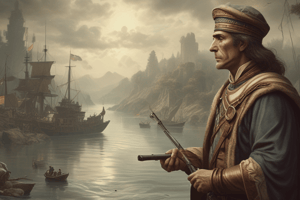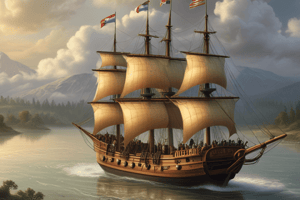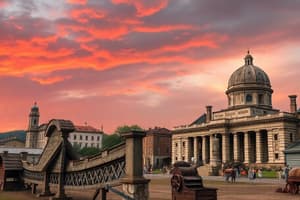Podcast
Questions and Answers
What does the term 'history' primarily refer to in modern terms?
What does the term 'history' primarily refer to in modern terms?
- Investigative learning about the past
- The subjective interpretation of historical events
- A record of natural phenomena
- An irretrievable account of mankind's past (correct)
Who is known as the father of history?
Who is known as the father of history?
- Aristotle
- Socrates
- Herodotus (correct)
- Thucydides
What distinguishes objective knowledge from subjective knowledge in the context of history?
What distinguishes objective knowledge from subjective knowledge in the context of history?
- Objective knowledge is biased, while subjective knowledge is factual.
- Objective knowledge is based on oral testimonies, whereas subjective knowledge relies on written records.
- Objective knowledge is derived from artifacts and documents; subjective knowledge is influenced by personal interpretation. (correct)
- Objective knowledge focuses on the emotional aspect of history, while subjective knowledge is purely analytical.
What is the primary goal of historians when writing history?
What is the primary goal of historians when writing history?
How do artifacts differ from documents in historical research?
How do artifacts differ from documents in historical research?
Which step is NOT part of the historical method?
Which step is NOT part of the historical method?
What does historiography involve?
What does historiography involve?
Why is it important for historians to distinguish between re-creation and creation?
Why is it important for historians to distinguish between re-creation and creation?
What event led to the death of Ferdinand Magellan?
What event led to the death of Ferdinand Magellan?
Which of the following social classes was NOT mentioned in Juan de Plasencia's account?
Which of the following social classes was NOT mentioned in Juan de Plasencia's account?
What central theme did Emilio Jacinto emphasize in his 'Kartilya ng Katipunan'?
What central theme did Emilio Jacinto emphasize in his 'Kartilya ng Katipunan'?
Which significant event did Corazon Aquino describe in her speech to the U.S. Congress?
Which significant event did Corazon Aquino describe in her speech to the U.S. Congress?
Which deity was primarily worshipped by early Tagalog communities according to Juan de Plasencia?
Which deity was primarily worshipped by early Tagalog communities according to Juan de Plasencia?
What must a historian ascertain about the primary witness in evaluating a detail's credibility?
What must a historian ascertain about the primary witness in evaluating a detail's credibility?
Which of the following is NOT a key test for determining credible historical evidence?
Which of the following is NOT a key test for determining credible historical evidence?
What characterizes hearsay evidence in historical analysis?
What characterizes hearsay evidence in historical analysis?
Why might a historian not fully rely on secondary witnesses?
Why might a historian not fully rely on secondary witnesses?
What is one important aspect when assessing corroboration in historical evidence?
What is one important aspect when assessing corroboration in historical evidence?
What does the term 'competence' refer to in the context of witness evaluation?
What does the term 'competence' refer to in the context of witness evaluation?
Which factor is considered suspicious when historians evaluate numerical estimates?
Which factor is considered suspicious when historians evaluate numerical estimates?
What is the primary concern historians have regarding secondary evidence?
What is the primary concern historians have regarding secondary evidence?
What defines a primary source in historical research?
What defines a primary source in historical research?
Which of the following is a characteristic of secondary sources?
Which of the following is a characteristic of secondary sources?
Which factor is NOT considered when determining the type of source?
Which factor is NOT considered when determining the type of source?
What does the term 'original' imply in the context of historical documents?
What does the term 'original' imply in the context of historical documents?
Which of the following could be considered a primary source?
Which of the following could be considered a primary source?
In historical analysis, what is the significance of having a source in its unpolished stage?
In historical analysis, what is the significance of having a source in its unpolished stage?
How do historians primarily differentiate between primary and secondary sources?
How do historians primarily differentiate between primary and secondary sources?
What is an example of a type of document that historians do NOT usually consider?
What is an example of a type of document that historians do NOT usually consider?
What is the primary purpose of external criticism in historical research?
What is the primary purpose of external criticism in historical research?
What type of document is defined as an account of individual experience revealing actions in social life?
What type of document is defined as an account of individual experience revealing actions in social life?
Which of the following techniques is not typically used in external criticism?
Which of the following techniques is not typically used in external criticism?
What are garbled documents characterized by?
What are garbled documents characterized by?
What is a key challenge in internal criticism?
What is a key challenge in internal criticism?
Which of the following best describes anachronisms?
Which of the following best describes anachronisms?
What is the process of gathering multiple copies of a document to restore its text called?
What is the process of gathering multiple copies of a document to restore its text called?
What aspect of personal documents is highlighted by their definition?
What aspect of personal documents is highlighted by their definition?
Flashcards are hidden until you start studying
Study Notes
What is History?
- History comes from the Greek word "historia" meaning "learning" or "knowing by inquiry."
- Herodotus is considered the father of history.
- Aristotle viewed history as a systematic account of natural phenomena.
- Modern definition of history is "the past of mankind," though this past is largely irretrievable.
Objectivity and Subjectivity in History
- History relies on artifacts (objects from the past) and documents, yet many facts are based on subjective testimony.
- Subjective knowledge is influenced by personal interpretation, while objective knowledge is considered factual and unbiased.
- Historians often rely on subjective interpretations of facts to recreate past events.
- History aims to interpret and describe events, explaining their cause, effect, and interconnection.
Artifacts as Sources of History
- Artifacts are physical remains from the past, while documents are written records of events.
- Both artifacts and documents serve as essential raw materials for writing history.
- Historians aim to be both descriptive (describing what happened) and interpretative (explaining why and how it happened).
- The historian's task is not just to describe the past, but to re-create it accurately through continuous refinement.
Historical Method and Historiography
- Historical method: The critical examination and analysis of past records.
- Historiography: The writing of history, involving the imaginative reconstruction of the past using data from the historical method.
- Historians must differentiate between re-creation (based on evidence) and creation (inventing facts), distinguishing history from fiction, poetry, or drama.
6 Steps of the Historical Method
- Topic selection
- Sources collection
- Sources criticism
- Synthesis
- Narrative
- Revision / Peer review
Primary vs. Secondary Sources
- Primary Sources: Testimony from eyewitnesses or participants in the events being described. Includes mechanical recordings of events.
- Primary Sources: Valuable due to firsthand accounts.
- Created at the time of the event.
- First-hand account by those involved in the event.
- Original material, such as raw data and creative ideas in their earliest, unmodified form.
- Secondary Sources: Accounts from individuals not directly present during the events.
- Secondary Sources: Interpret and analyze primary sources.
- Created after the event.
- Interpretative.
- Synthesized content.
How to Determine Primary vs. Secondary Sources
- Creation date.
- Author's role (narrator/interpreter).
- Purpose of the source.
- Originality of the source (new ideas/interpretations).
The Multifaceted Meaning of "Original" in History
- Containing fresh or creative ideas.
- Written in its original language, not translated.
- In its earliest unpolished stage.
- The approved and untampered version of the text.
- The earliest available source of information it provides.
Document and Documentation
- Document: Can refer to a written source of historical information, contrasted with oral testimony, artifacts, pictorial survivals, and archaeological remains.
- Documentation: Any process of proof based on any source, whether written, oral, pictorial, or archaeological.
- Human document: An account of individual experience that reveals the individual's actions as a human agent and a participant in social life.
- Personal document: Any self-revealing record that intentionally or unintentionally provides information about the author's mental life structure, dynamics, and functioning.
External Criticism
- Evaluates the authenticity of a historical document.
- Forged Documents: Historians must be wary of forged documents, which may serve false claims or political propaganda.
- Tests of Authenticity: Includes checking for anachronisms (elements misplaced in time), such as style, spelling, and grammar.
- Anachronisms: Historians check for misplaced details in time, such as style, spelling, and grammar, to determine authenticity.
- Material Evidence: Examination of materials used in a document (ink, paper) to verify its claimed time period.
- Cross-Referencing: Historical documents are cross-checked with other independent sources to confirm their validity.
- Garbled Documents: Altered documents, partially inauthentic, often resulting from copying errors or deliberate modifications.
- Historians compare multiple copies to restore the original text.
- Restoration of Texts: Gathering multiple copies and comparing them for differences.
- Historians must determine if additions or omissions have altered the original text.
Internal Criticism
- Historical Fact: Even seemingly simple statements can be questioned.
- Doubts about specific details: often arise from a lack of firsthand testimony, not disagreements among witnesses.
- Interrogative Hypothesis: Historians ask key questions to assess credibility of witness testimony and supporting evidence.
General Rules for Historical Evidence
- Any single detail of testimony is considered credible if it passes four key tests:
- Was the primary witness capable of telling the truth?
- Was the primary witness willing to tell the truth?
- Is the primary witness accurately reported regarding the detail?
- Is there independent corroboration of the detail?
- Any detail that passes all four tests constitutes credible historical evidence.
Interrogative Hypothesis
- All witnesses, even those close to an event, are not equally competent.
- Competence depends on expertise, mental and physical health, age, education, memory, narrative skill, etc.
- The ability to estimate numbers is particularly suspect.
Hearsay, Secondary Evidence, and Corroboration
- Hearsay evidence: (information passed from one person to another) is generally dismissed unless verified.
- Secondary evidence: Only partially reliable and requires corroboration.
- Historians use secondary witnesses but ask these questions:
- On whose primary testimony does the secondary witness base their statements?
- Was the primary testimony accurately reported by the secondary witness?
- If not, which details were accurately reported?
- Corroboration: The process of confirming a statement or piece of evidence with additional evidence or testimony.
- Historians accept as historical only those particulars that rely on independent testimony from two or more reliable witnesses.
Philippine Historical Periods and Sources
Pre-colonial Period:
- Antonio Pigafetta's "First Voyage Around the World":
- Pigafetta's diary recounts Magellan's expedition to the Philippines:
- Arrival in Homonhon.
- First Mass in Mazaua.
- Conversion of the King and Queen of Cebu to Christianity.
- Battle of Mactan, where Magellan was killed by Lapu-Lapu.
- Pigafetta's diary recounts Magellan's expedition to the Philippines:
Spanish Colonial Period:
- Juan de Plasencia's "Customs of the Tagalogs":
- Describes the social hierarchy of early Tagalog communities:
- Datu
- Maharlica
- Aliping namamahay
- Aliping sa guiguilir
- Covers their religious practices, such as the worship of Bathala and other deities.
- Includes beliefs in sorcerers and witches (mangagauay, mancocolam).
- Describes the social hierarchy of early Tagalog communities:
1896 Philippine Revolution:
- Emilio Jacinto's "Kartilya ng Katipunan":
- Outlined values that members of the Katipunan (revolutionary society) must follow:
- Loyalty
- Equality
- Honor
- Resistance against oppression
- Jacinto's work challenged Spanish claims of racial superiority and called for Filipino unity.
- Outlined values that members of the Katipunan (revolutionary society) must follow:
Restoration of Philippine Democracy (1986):
- President Corazon Aquino's Speech before the U.S. Congress (September 18, 1986):
- A personal reflection on the struggles her family faced under the Marcos dictatorship and the Filipino people's peaceful fight for democracy.
- Recounted the assassination of her husband, Benigno Aquino Jr., and the role of the 1986 People Power Revolution in ousting Marcos and restoring democracy.
Studying That Suits You
Use AI to generate personalized quizzes and flashcards to suit your learning preferences.




